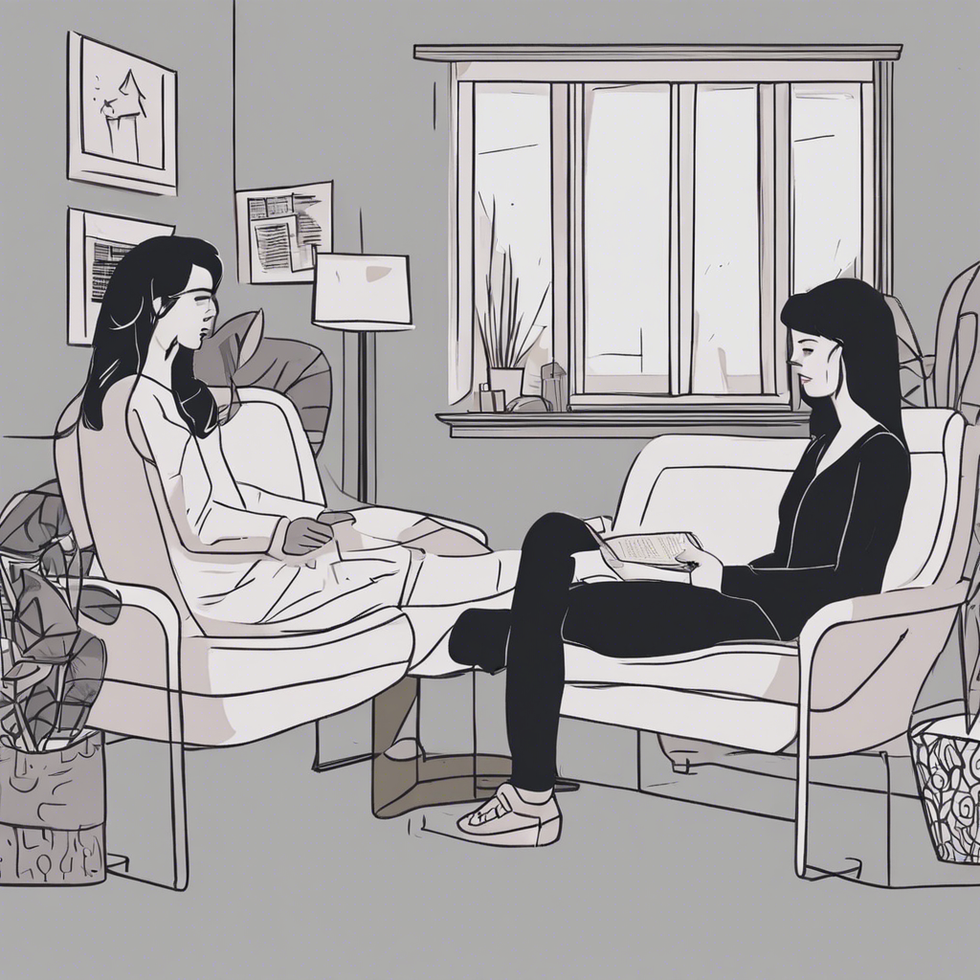Yesterday, one of my friends asked me a few questions. She was stressed about college, and how to choose between all the different options (She's a junior in high school). People kept approaching her, asking her what she planned to do after high school, and where she was going to go. She wanted to know how to choose a school, a career, and what to say to everyone who was asking about these things. I completely understand this dilemma. I used to wonder that all the time what I would choose. People would put pressure on me to choose, and I eventually caved, just going with a generic answer. Now a senior in college, I am confident in my choices. I know that the career and university that I chose were PERFECT for me. I'm now here to help anyone struggling with these things, by showing you what I did. I hope that it is able to help you!
Now, you have to understand three things before I go into this. First of all, know that the people that are asking you what you're going to do aren't going to start an angry mob if you don't know. If you have to answer them, don't feel pressured by the questions, take your time and answer truthfully: "I'm not really sure yet, but I am working on it!". They'll nod their heads and move on. Second, here's a little thing that nobody really wants you to know: Until they get there, NO ONE knows what they're going to do after school, or where to go, or what to major in. Even me, I had a solid three-year plan. Go on-campus to a community college, get a degree in dental hygiene, and become a dentist's assistant...not exactly what I'm doing today, while is a double major in English Language and Literature, and Digital Photography. Yeah, little different. I chose to change my degree in my senior year, right before I applied to Southern New Hampshire University's online program. Third, understand that just because you choose something, doesn't mean you're tied to it. If you decide at some point in your life that you don't love your job, you can change it. Granted, you may have to stay in the job that you went to school for until you have enough cash to get a second degree, but the This choice isn't a set path for your life. A lot of people go to continuation school and get another degree. It's not too big of a deal. You should still take careful consideration for it because it is a lot of money, just don't get overwhelmed in choosing the perfect degree.
I know that this is a struggle for everyone moving on from high school. With all the questions about college, choosing a profession, and loans everything gets blurred. All of this stuff seems REALLY intimidating at first, but when you really look at it, one piece at a time, it's a little more simple. To choose a profession, start with your interests. Get out a sheet of paper and write down your top ten favorite hobbies. If you don't have that many, write down what you like to do in your spare time or things that sound interesting to you. If you're still stuck, do an online search for 'college majors list' or 'best careers.' Read through the lists, and copy the ones that stand out to you into a Word document/Excel.
Now that you have your list narrow it down a little more. If something on the list sounds interesting, but you don't really have a knack for it, or it's impractical as a career, strike it from the list. Next, take away everything except your five favorites. Take the rest of your junior/senior year looking into those that sound appealing, to see if you could do, and it would be able to support you. By the end of your senior year, you should have it narrowed down a little more. Don't think that you're tied to these things though. If something else piques your interest, add it to the list! Your first year or two in college, you can narrow it even further, as there are a bunch of 'general education' classes you need for all majors. It's
Before we go into choosing a college, I need to point out that some people don't go to college. If your profession of interest doesn't require a degree (i.e., photojournalist, journalist, carpenter, repair specialist), you should at least consider skipping college. That's approx. $40,000 you're saving...a year. If you're hesitant to leave college behind, because you want to get away, or have an adventure go on a trip. It's seriously MUCH cheaper, and wastes less time. Wanted a dorm-roommate to be bff's for life with? Get an apartment, and a roommate there. Again, much cheaper than college, and they pay half the rent! I really recommend at LEAST considering not going to college. If you're not sure about it, talk it over with a parent or guidance counselor. They may be able to give you a more clear approach, and give you a few pros and cons.
Let's get into choosing a college! First, choose between online or on-campus. If you're going for the adventure AND the degree, you probably want on-campus. If money's a pretty big object, or you already had a job you want to keep, or if you're just a really busy person, you could look into online colleges (just make sure it's credible, first...), as they're a lot cheaper, and they don't charge for room, board, or food. They're also flexible, and let you learn from anywhere at any time. There are a lot of great online colleges, choosing one mostly depends on what degree you want, the price of tuition, and what their ratings/credibility is.
If you've already decided that you want to go to a physical school, it's the same 'process', just with an added step. Choosing where to physically go. As all (good) real estate agents know, it's about location. Location. Location. Location!! If you were planning on staying in the same state/area, look up colleges in that vicinity. If you are open to anywhere, start with your major. Find a few colleges that offer the degree you want, and look up the ratings. If they're good, put it on the list. If they're negative, strike it! If you still don't know what to choose, take your list to a guidance counselor or parent, and ask for their advice about what to choose.
Finally, the question of 'What to say??'. If you're going to answer, don't beat around the bush. Be honest. Tell them you've started working on it, and have a few different ideas for what's after high school, but don't have any concrete choices. They'll understand, having been through it themselves. Good luck with the college process!!



 Photo by
Photo by  person holding black smartphone on white textile
Photo by
person holding black smartphone on white textile
Photo by  StableDiffusion
StableDiffusion
 Photo by
Photo by  Photo by
Photo by 
 roommate as a therapist
StableDiffusion
roommate as a therapist
StableDiffusion
 woman in white shirt eating pizza
Photo by
woman in white shirt eating pizza
Photo by  person holding remote pointing at TV
Photo by
person holding remote pointing at TV
Photo by  person holding assorted clothes in wooden hanger
Photo by
person holding assorted clothes in wooden hanger
Photo by  a couple of
a couple of  friends cleaning apartment
StableDiffusion
friends cleaning apartment
StableDiffusion
 man driving car during golden hour
Photo by
man driving car during golden hour
Photo by  bacon strips and melted cheese topped fries on oval white and blue platter with gray stainless steel forks
Photo by
bacon strips and melted cheese topped fries on oval white and blue platter with gray stainless steel forks
Photo by  selective focus photography of eyeshadow palette
Photo by
selective focus photography of eyeshadow palette
Photo by  brown wooden framed white padded chair in between green indoor leaf plants inside bedroom
Photo by
brown wooden framed white padded chair in between green indoor leaf plants inside bedroom
Photo by  women forming
women forming  taking
taking  man in red polo shirt pouring wine on clear wine glass
Photo by
man in red polo shirt pouring wine on clear wine glass
Photo by  woman in black jacket standing on road during daytime
Photo by
woman in black jacket standing on road during daytime
Photo by 
 StableDiffusion
StableDiffusion
 StableDiffusion
StableDiffusion
 student thinking i shouldnt have procrastinated all semester
StableDiffusion
student thinking i shouldnt have procrastinated all semester
StableDiffusion
 Photo by
Photo by  Photo by
Photo by  Photo by
Photo by  StableDiffusion
StableDiffusion
 StableDiffusion
StableDiffusion
 Photo by
Photo by  Photo by
Photo by 


 Lumiere figure at the Disney Store at the Ala Moana Shoppi… | Flickr
Lumiere figure at the Disney Store at the Ala Moana Shoppi… | Flickr








 StableDiffusion
StableDiffusion StableDiffusion
StableDiffusion 10. Extra BlanketsJuwenin Home 100% Cotton Knitted Throw Blanket
10. Extra BlanketsJuwenin Home 100% Cotton Knitted Throw Blanket StableDiffusion
StableDiffusion StableDiffusion
StableDiffusion File:Kishlaru familie.jpg - Wikimedia Commons
File:Kishlaru familie.jpg - Wikimedia Commons Photo by Hanna Balan on Unsplash
Photo by Hanna Balan on Unsplash StableDiffusion
StableDiffusion black blue and yellow round illustrationPhoto by
black blue and yellow round illustrationPhoto by 







